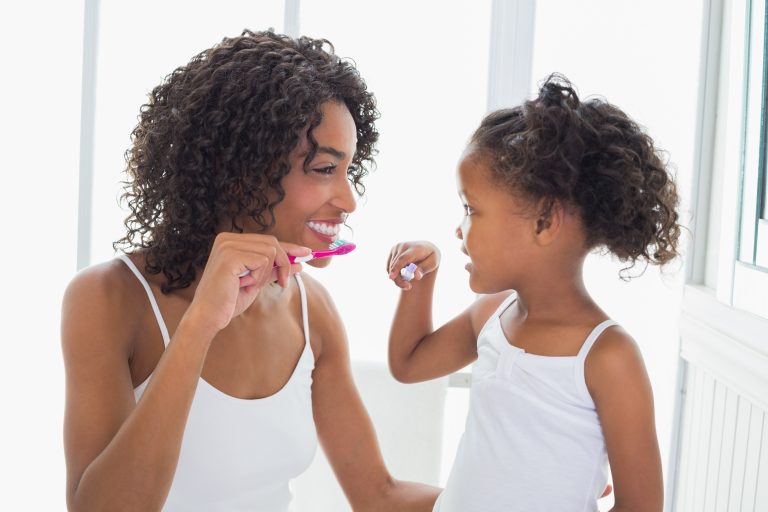
The difference pediatric dentistry makes
It’s our goal to start children off on the right foot with kid-friendly pediatric dental care that builds a positive relationship between the dental team and the little patient and makes kids feel engaged and empowered to care for their own oral health. Happy, healthy habits set the tone for a lifetime of dental care that they actually look forward to.
Pediatric dental care accomplishes this from the very first appointment, through kid-friendly routine teeth cleanings and at every milestone your child reaches. We’re happy to support these little patients as they discover their new teeth, lose baby teeth, grow their adult teeth and for other commonly shared experiences like getting a filling (that isn’t so scary after all!) or opting for orthodontics as young adults.
Why is children’s dental care so important?
Believe it or not, some people ask why children’s dental care is so important because the primary teeth fall out anyway! Most children have their baby teeth by the age of 3. This first set of teeth begins to fall out by about the age of 6 and, except for wisdom teeth, most children have all their adult teeth by their early teens. Children gain and lose their primary teeth during their fundamental years and the state of their dental health has many long-reaching consequences.
Poor dental health hurts
Just like grown-ups, children are also at risk of tooth decay, tooth sensitivity, infection and gum disease. Without a frame of reference, children are capable of normalizing a lot of pain and discomfort but they still feel it all the same. If you notice your child avoids hot and cold foods and drinks or chewy food, or if you notice your child only chewing on one side of their mouth they may be trying to cope with dental pain or sensitivity.
Baby teeth set the stage for adult teeth
As the baby tooth loosens and falls out, the root is reabsorbed and the space left behind acts as a guide for the replacement adult teeth. If a baby tooth needs to be extracted prematurely it can cause problems like unexpected crowding or crooked adult teeth. Maintaining strong, healthy baby teeth and healthy supportive tissue and gums gives adult teeth their strongest start.
The cornerstone of confidence
A full set of healthy teeth is essential for children learning how to speak and smile. Children will also begin to form attachments and social skills from a very young age. Having dental complications, dental pain or sensitivity will impact how they are able to express themselves and how they are perceived by their peers.
Good eating habits for growing bodies
A wide variety of different foods is especially important for children and can be challenging enough for parents of picky eaters. Children experiencing discomfort and dental pain may find themselves avoiding crunchy, chewy or textured foods. Children may start a lifetime habit of eating on one side only or eating in the wrong part of their mouth or they might not want to eat very much at all.
Your child’s first appointment
For patients of all ages, our ultimate goal is your health, your comfort and your satisfaction. In pediatric dentistry, special consideration is paid to the challenges that our youngest patients face when they sit in the chair. We’ll keep a close eye on children-specific oral health markers and milestones and we’ll talk to your child in a kid-friendly way that makes them feel safe and engaged.
Show and Tell
Some kids are adventurous explorers with a million questions. Others feel bashful and careful or even anxious about new experiences. We want all kids to feel safe and engaged and to feel positive about visiting the dentist. The best way to meet their emotional needs is to have a conversation in kid-friendly terms. We’d like to start each appointment by hearing their thoughts and concerns and we’d like to explain what we plan to do during the appointment and answer any questions they have.
Gentle Examination
With special attention paid to children-specific oral health markers, we will gently examine your child’s gums, tongue, teeth and overall health. During our exam, we’ll keep an eye on the progress of their primary teeth and adult teeth. Our exam will reveal areas of concern or tricky spots that may need some extra attention at home or at future appointments.
Keeping you in the loop
After an exam, we’ll have some advice for both the young patient and their parent or guardian. Sometimes we have extra tips and tricks to help with brushing those hard-to-reach spots at home. We’ll let you know if there are any problem areas that we plan to keep an eye on and what to look out for between appointments. Together, we make a great team!
Contact us today
to schedule an initial consultation & exam.
Your consultation will include an examination of everything from your teeth, gums and soft tissues to the shape and condition of your bite. Generally, we want to see how your whole mouth looks and functions. Before we plan your treatment we want to know everything about the health and aesthetic of your smile, and, most importantly, what you want to achieve so we can help you get there.
Frequently Asked Questions









